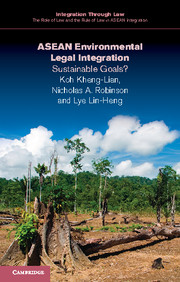Book contents
- Frontmatter
- Contents
- List of tables
- General editors’ preface
- Foreword – Professor Tommy
- Acknowledgments
- Introduction: exploring environmental law in Southeast Asia
- 1 ASEAN and environmental sustainability
- 2 Integrating sustainability into ASEAN state practice
- 3 The environment in the ASEAN region
- 4 Environmental sustainability laws in the ASEAN member states
- 5 ASEAN collaboration towards environmental sustainability
- 6 ASEAN and climate disruption
- 7 Conclusions: ASEAN's challenging way forward
- Executive summary
- Appendix A ASEAN organizational structure relevant to the environment – the ASEAN Charter
- Appendix B Founding of ASEAN – a short history
- Index
1 - ASEAN and environmental sustainability
Published online by Cambridge University Press: 05 April 2016
- Frontmatter
- Contents
- List of tables
- General editors’ preface
- Foreword – Professor Tommy
- Acknowledgments
- Introduction: exploring environmental law in Southeast Asia
- 1 ASEAN and environmental sustainability
- 2 Integrating sustainability into ASEAN state practice
- 3 The environment in the ASEAN region
- 4 Environmental sustainability laws in the ASEAN member states
- 5 ASEAN collaboration towards environmental sustainability
- 6 ASEAN and climate disruption
- 7 Conclusions: ASEAN's challenging way forward
- Executive summary
- Appendix A ASEAN organizational structure relevant to the environment – the ASEAN Charter
- Appendix B Founding of ASEAN – a short history
- Index
Summary
The Association of Southeast Asian Nations (ASEAN) aspires to be a neighborhood where richly diverse nations can attain common purposes by cooperating together in consensual and graduated steps. It proposes and posits “One Vision, One Identity, and One Caring and Sharing Community” as the uniting common ground. Composed of ten sovereign states, ASEAN has at its core an international legal framework, through which it shapes its steps toward a shared vision. The goal of sustainable development, as articulated through the UN Conference on Environment and Development, is a central vision shared by each ASEAN member state.
ASEAN cooperation on common policies and laws for the environment and development emerged through agreeing on topics of common concern, preparing draft programs that include capacity-building measures to ensure that each member state is ready to collaborate further, followed by the preparation of draft “soft law” policy declarations vetted through the appropriate governmental levels (civil service, ministers or heads of state). The soft law provides the basis for adopting congruent national laws and regulations to further a common ASEAN approach. In the environmental arena, this is well illustrated by the ASEAN biodiversity programs and the system of protected natural heritage areas.
The ASEAN Way builds confidence and avoids conflict among the member states. These goals are fundamental. War in Indochina raged through much of the twentieth century. As Principles 25 and 26 of the 1992 Rio Declaration on Environment and Development proclaim, “Warfare is inherently destructive of sustainable development. States shall therefore respect international law providing protection for the environment in times of armed conflict and cooperate in its further development, as necessary … Peace, development and environmental protection are interdependent and indivisible.” ASEAN member states have identified cooperation in the field of environmental protection to be a common priority. Each has acknowledged the objective of sustainable development, as formulated by Agenda 21. Each is at a different point along the pathway to making development sustainable.
ASEAN perspectives on environmental sustainability cannot be separated from the history of each member state. Except for Thailand, each was colonized by states from outside the region. This left a legacy of civil law (with the Dutch, French or Spanish variants) and common law (with the British or American variants) and a legacy of Islamic legal principles and more recently socialist law principles, in the various states comprising ASEAN.
- Type
- Chapter
- Information
- ASEAN Environmental Legal IntegrationSustainable Goals?, pp. 13 - 26Publisher: Cambridge University PressPrint publication year: 2016



